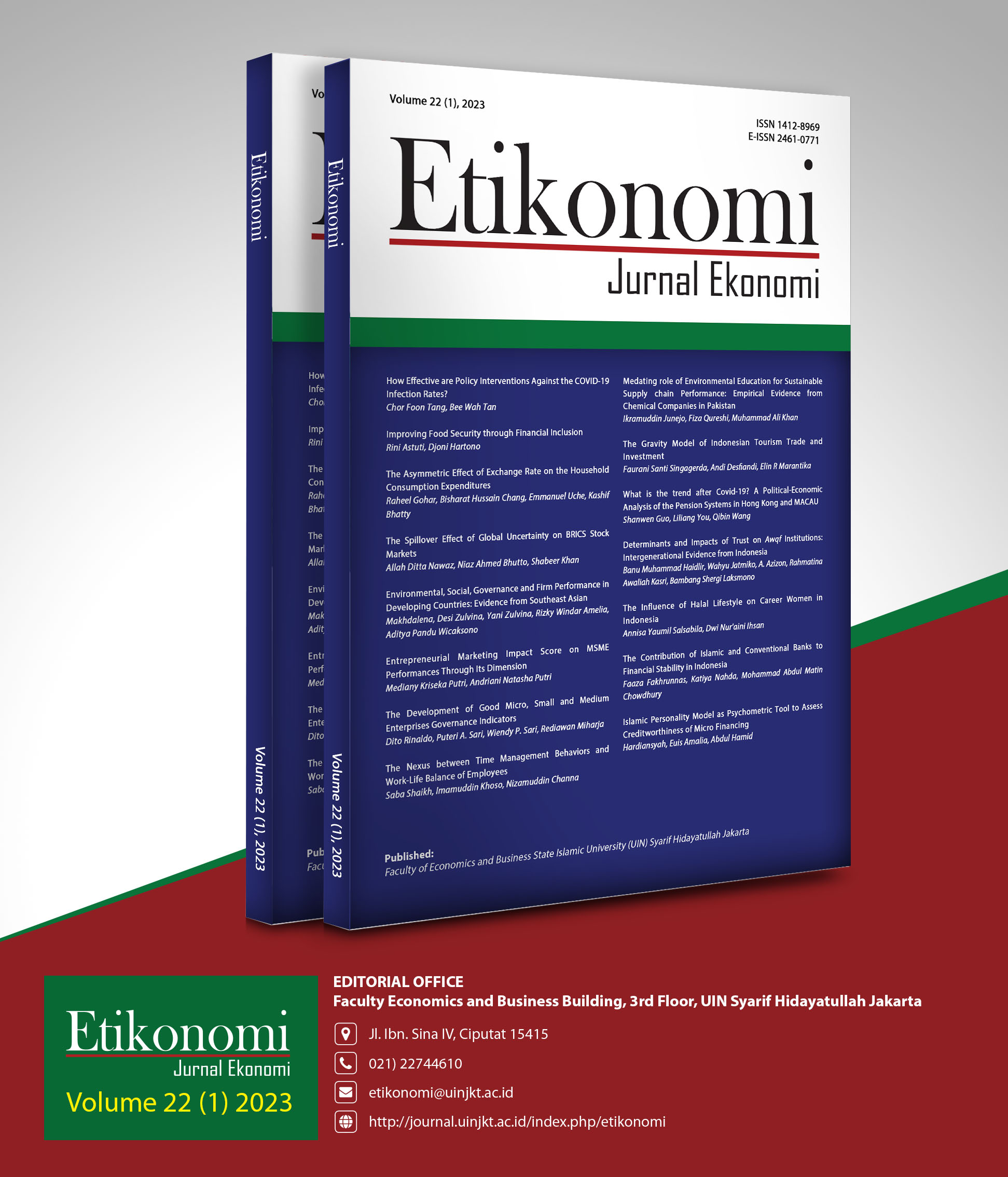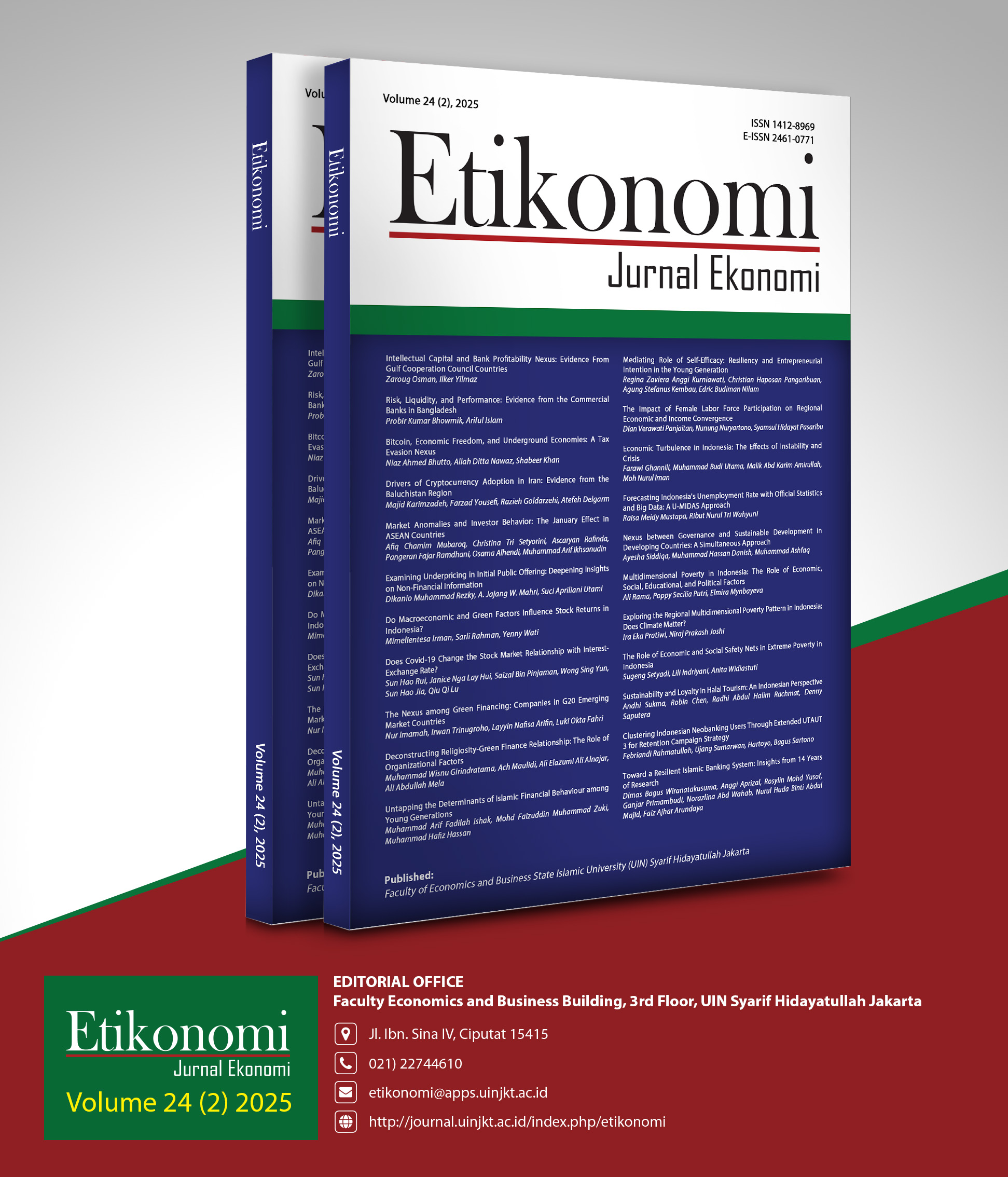Mediating role of Environmental Education for Sustainable Supply chain Performance: Empirical Evidence from Chemical Companies of Pakistan
DOI:
https://doi.org/10.15408/etk.v22i1.27139Keywords:
environmental, education, sustainable, supply chain, performanceAbstract
Previous studies have been conducted in developed countries, and only a few are conducted in developing countries. Furthermore, a contribution of this is that the mediating role of environmental education is considered in the present study. This study aimed to identify the mediating role of environmental education between internal environmental management, supplier selection, and green packaging on sustainable supply chain performance in Pakistan. A total of 250 chemical companies filled out the questionnaire. The findings of this study revealed a partial mediation effect of environmental education for internal environmental management, supplier selection, and green packaging in sustainable supply chain performance in Pakistan. However, the supplier selection results are more critical compared to internal environment management and green packaging due to the higher beta value. This study proposed a pivotal variable to achieve a sustainable supply chain in developing countries such as Pakistan.
JEL Classification: Q01, Q51, Q54, Q56
How to Cite:
Junejo, I., Qureshi, F., & Khan, M. A. (2023). Mediating role of Environmental Education for Sustainable Supply Chain Performance: Empirical Evidence from Chemical Companies of Pakistan. Etikonomi, 22(1), 131–142. https://doi.org/10.15408/etk.v22i1.27139.
Downloads
References
Al-Ghwayeen, W.S. and Abdallah, A.B. (2018). Green supply chain management and export performance: The mediating role of environmental performance. Journal of Manufacturing Technology Management, 29(7), 1233-1252.
Asiaei, K., Bontis, N., Alizadeh, R., & Yaghoubi, M. (2022). Green intellectual capital and environmental management accounting: Natural resource orchestration in favor of environmental performance. Business Strategy and the Environment, 31(1), 76-93.
Chan, R.Y.K., He, H., Chan, H.K. and Wang, W.Y.C. (2012). Environmental orientation and corporate performance: the mediation mechanism of green supply chain management and moderating effect of competitive intensity. Industrial Marketing Management, 41(4), 621-630.
Chao, Y. L. (2020). A Performance Evaluation of Environmental Education Regional Centers: Positioning of Roles and Reflections on Expertise Development. Sustainability, 12(6), 2501.
Chen, C. W., Xie, J., Yang, F. X., Zhang, H. L., Xu, Z. W., Liu, J. L., & Chen, Y. J. (2018). Development of moisture‐absorbing and antioxidant active packaging film based on poly (vinyl alcohol) incorporated with green tea extract and its effect on the quality of dried eel. Journal of Food Processing and Preservation, 42(1), e13374.
Chowdhury, M. M. H. (2014). Supply chain sustainability and resilience: The case of apparel industry in Bangladesh (Doctoral dissertation, Curtin University).
Elfithri, R., & Mokhtar, M. B. (2018). Integrated Water Resources Management in Malaysia: Some Initiatives at the Basin Level. Water Resources Management, 78, 231-244.
Esfahbodi, A., Zhang, Y., Watson, G. and Zhang, T. (2017). Governance pressures and performance outcomes of sustainable supply chain management – an empirical analysis of UK manufacturing industry. Journal of Cleaner Production, 155, 66-78.
Foo, P. Y., Lee, V. H., Tan, G. W. H., & Ooi, K. B. (2018). A gateway to realizing sustainability performance via green supply chain management practices: A PLS–ANN approach. Expert Systems with Applications, 107, 1-14.
Ghosh, S., Mandal, M. C., & Ray, A. (2021). Green supply chain management framework for supplier selection: an integrated multi-criteria decision-making approach. International Journal of Management Science and Engineering Management, 2(3), 125-151.
Hair, J. F., Gabriel, M., & Patel, V. (2014). AMOS covariance-based structural equation modeling (CB-SEM): Guidelines on its application as a marketing research tool. Brazilian Journal of Marketing, 13(2).
Kannan, D., de Sousa Jabbour, A. B. L., & Jabbour, C. J. C. (2014). Selecting green suppliers based on GSCM practices: Using fuzzy TOPSIS applied to a Brazilian electronics company. European Journal of Operational Research, 233(2), 432-447.
Khan, S. A. R., Yu, Z., Sharif, A., & Golpîra, H. (2020). Determinants of economic growth and environmental sustainability in South Asian Association for Regional Cooperation: evidence from panel ARDL. Environmental Science and Pollution Research, 27(36), 45675-45687.
Kung, F.H., Huang, C.L. and Cheng, C.L. (2012). Assessing the green value chain to improve environmental performance evidence from Taiwan’s manufacturing industry. International Journal of Development Issues, 11(2), 111-128.
Min, H. and Galle, W.P. (2001). Green purchasing practices of US firms. International Journal of Operations & Production Management, 21(9), 1222-1238.
Paulraj, A. (2011). Understanding the relationships between internal resources and capabilities, sustainable supply management and organizational sustainability. Journal of Supply Chain Management,47(1), 20-37.
Paulraj, A. (2011). Understanding the relationships between internal resources and capabilities, sustainable supply management and organizational sustainability. Journal of Supply Chain Management, 47(1), 19-37.
Quan, M. Y., Wang, Z. L., Liu, H. C., & Shi, H. (2018). A hybrid MCDM approach for large group green supplier selection with uncertain linguistic information. IEEE Access, 6, 50372-50383.
Sammalisto, K. and Brorson, T. (2008). Training and communication in the implementation of environmental management systems (ISO 14001): a case study at the University of Gavle, Sweden. Journal of Cleaner Production, 16(3), 299-309.
Sarkis, J. (2003). A strategic decision framework for green supply chain management. Journal of Cleaner Production, 11(4), 397-409.
Seman, N. A. A., Govindan, K., Mardani, A., Zakuan, N., Saman, M. Z. M., Hooker, R. E., & Ozkul, S. (2019). The mediating effect of green innovation on the relationship between green supply chain management and environmental performance. Journal of cleaner production, 229, 115-127.
Sezen, B., & Çankaya, S. Y. (2018). Green supply chain management theory and practices. In Operations and Service Management: Concepts, Methodologies, Tools, and Applications, 118-141.
Tseng, M. L., & Chiu, A. S. (2013). Evaluating firm's green supply chain management in linguistic preferences. Journal of cleaner production, 40, 22-31.
Tseng, Y. C., & Wang, S. M. (2020). Understanding Taiwanese adolescents’ connections with nature: rethinking conventional definitions and scales for environmental education. Environmental Education Research, 26(1), 115-129.
Wang, Y. C., & Chiou, S. C. (2018). An analysis of the sustainable development of environmental education provided by museums. Sustainability, 10(11), 4054.
Xiao, L., Zhang, S., Wei, G., Wu, J., Wei, C., Guo, Y., & Wei, Y. (2020). Green supplier selection in steel industry with intuitionistic fuzzy Taxonomy method. Journal of Intelligent & Fuzzy Systems, 39(5), 7247-7258.
Yildiz, I., Açıkkalp, E., Caliskan, H., & Mori, K. (2019). Environmental pollution cost analyses of biodiesel and diesel fuels for a diesel engine. Journal of environmental management, 243, 218-226.
Zaid, A. A., Jaaron, A. A., & Bon, A. T. (2018). The impact of green human resource management and green supply chain management practices on sustainable performance: An empirical study. Journal of cleaner production, 204, 965-979.
Zhu, Q., Sarkis, J. and Geng, Y. (2005). Green supply chain management in China: pressures, practices and performance. International Journal of Operations & Production Management, 25(5), 449-468.
Zhu, Q., Sarkis, J. and Lai, K.H. (2007a). Initiatives and outcomes of green supply chain management implementation by Chinese manufacturers. Journal of Environmental Management, 85(1), 179-189.
Zhu, Q., Sarkis, J. and Lai, K.H. (2013). Institutional-based antecedents and performance outcomes of internal and external green supply chain management practices. Journal of Purchasing & Supply Management, 19(2), 106-117.














